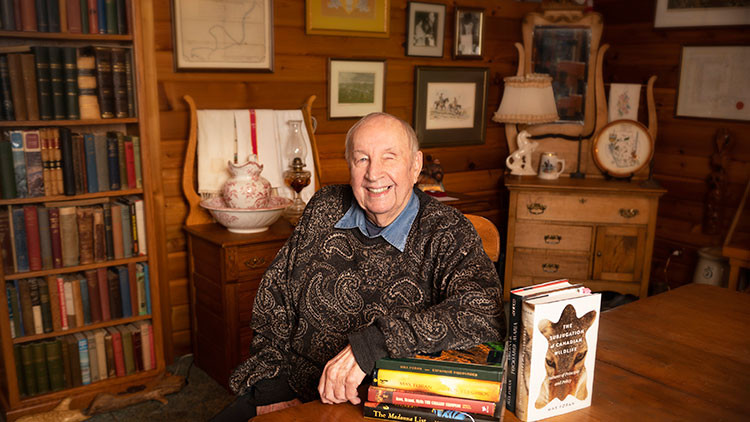Non-urgent government operations are closed December 24 to January 1, reopening January 2. View available services during this period.

“If you don’t know the past, you’ve got no perspective on the present. To live meaningfully in the present, you should have an awareness of where you’ve come from, where your country has come from, where your civilization has come from, and even how your own species has interacted with its environment. Only an awareness of the past can give you that.”
Max Foran of Priddis is highly respected throughout Alberta as a teacher, professor, author, historian, media figure, wildlife activist and contributor to his community. He has influenced generations of students, historians and Albertans with his original thinking and dynamic approach.
Maxwell Laurence Foran was born at home on August 6, 1935, in Granville, a working-class suburb of Sydney, Australia. His father Stanley, the son of an Irish immigrant, was a labourer. His mother Lillian had little formal schooling but taught herself to read proficiently. It was the Depression, and the family was poor, living in a tiny, 500-square-foot house on the edge of the city, bordering the bush. Still, Max and his younger brother Greg were happy. Always outdoors, the boys had the freedom to do what they wanted, with the only rule that they be home by teatime. It was a “Huck Finn sort of life,” and they relished it.
Max had an excellent memory, even as a child. His quick mind benefitted him in school and helped him learn Latin as an altar boy. He received a scholarship to a Catholic boarding school for his senior years, but he quickly discovered that the school dissuaded freedom of thought. There, rote learning was the norm. He was taught that it was his job to “just do, not think.”
In 1951, he was just 16 years old when he received a scholarship to attend teacher’s college. Again, the pressure to just do, not think, rankled Max. As a practice teacher, he was expected to simply shovel the content, rather than trying to engage his students. After finishing teacher’s college in 1953, Max entered compulsory national service in 1954. Later that year, at the age of 18, he started teaching.
Fast forward to September 1962 when his principal knocked on Max’s classroom door and introduced the new teacher, a Canadian named Heather MacEwan. To welcome Heather, Max offered to take her sight-seeing after school. The two quickly fell in love and decided to marry. Max was encouraged by her description of Canada’s education system. Heather returned to Canada ahead of him, arranging for a job interview for Max with the Calgary Board of Education.
In 1963, Max traded Sydney’s summer for Calgary’s winter and started teaching at King Edward School. “I changed countries and jobs and got a wife, all within two weeks,” laughs Max. They married in December, with Heather’s parents, Phyllis and Grant MacEwan (AOE 1982), in attendance. Her family warmly welcomed Max to the fold with Grant fondly dubbing him “Mr. Max.” After living in the city for 10 years, the couple and their two young daughters, Fiona and Lynwyn, built a log home on family land near Priddis.
Max attended summer school in 1964 to obtain an Alberta teaching certificate. Although he had never taken academics seriously, he did well. Encouraged, he enrolled in the Bachelor of Education program at the then University of Alberta in Calgary, taking classes at night while teaching by day. As an undergrad, he had the opportunity to take two senior graduate history classes. Max was hooked.
For the first time in his life, Max had mentors. He observed them closely, then developed his own style, inspired by the researching and writing skills of western Canadian historian Dr. David Breen and the teaching and speaking abilities of his father-in-law Dr. Grant MacEwan. As in teaching, he learned to practice both in his own way.
After completing his B.Ed. in 1968, Max would go on to receive his M.A. and Ph.D. in history from the University of Calgary. He made the most of the extensive archival collections at the Glenbow Museum, becoming a specialist in western Canadian history, particularly the city of Calgary.
As Max pursued his own education, he continued to teach elementary school. He was promoted quickly within the Calgary Board of Education, becoming principal at Sunnyside School, Haysboro School, Clem Gardner School and Midnapore School. During this time, Max accomplished much as an historian. He possessed a singular ability to translate his research to varied audiences, both academic and popular.
Max’s eyesight, which had always given him trouble, deteriorated in the mid-1980s. Long hours of research became difficult, so prior to corrective surgery, he decided to write a novel instead. His historical novel The Madonna List was recognized through a publisher’s award at the 2005 Alberta Book Awards and was subsequently translated into eight languages.
Max left teaching in 1993 to join the fledgling Western Heritage Centre in Cochrane as its research director and curator. The interpretive centre was dedicated to the cattle industry and rodeo, and housed Max’s impeccably researched storylines.
In 2000, the incoming dean of the new Faculty of Communication and Culture at UCalgary offered Max a tenure-track assistant professorship in Canadian Studies. He quickly developed a strong reputation as an exceptional teacher with an outstanding scholarly record, becoming a full professor in 2007. Max was a beloved professor at the university, with many students enrolling in every course he offered. In fact, several of his elementary school students became his students again in university.
Max could also be relied on to share his enthusiasm for history with the public. As a radio personality, he was the authoritative voice on Radio CKO’s Historical Sketches. On CBC Radio, he participated in the History of Calgary Vignettes and Interviews with The Homestretch. Most of his television work was with the History Channel, including programs on John Palliser, the CPR and John Ware. He was also a regular radio and TV commentator on the livestock industry and on the Calgary Stampede. Since 1971, Max has given innumerable presentations on Canadian and Alberta history. His audiences represent people from all walks of life. His university lectures are master classes in effective communication through student engagement and inspiration, sparking the interest of his listeners.
Max has advanced the scholarship on any subject on which he has written, broadening his audiences’ perspectives. He has inspired countless students, readers and listeners to understand Alberta in ways they might not have imagined. Max has published dozens of single-authored peer-reviewed articles in scholarly journals, in addition to 14 transformative history books covering a wide spectrum of subjects on Alberta and Albertans. They are regularly cited as sources in scholarly papers.
In 2003, Max wrote what he considers to be his third-best book: Trails and Trials: Markets and Land Use in the Alberta Beef Cattle Industry, 1881-1948. While multiple histories had been written about ranching in Alberta, all accounts focussed on the open range era, which had largely ended by 1912. Trails and Trials filled in the missing history. Max says his second-best book is 2009’s Expansive Discourses: Urban Sprawl in Calgary, 1945-1978. It studied how and why local government and land developers created a city post-WWII that exemplifies urban sprawl.
With close to 60 years in the classroom, Max was still on the top of his game. He took a research leave in 2013 to write a book, but fate had different plans. Heather was diagnosed with terminal Stage 4 lung cancer and Max retired from the university at the age of 79. At Heather’s request, he wrote 2018’s The Subjugation of Canadian Wildlife: Failures of Principle and Policy. Following in the footsteps of her conservationist father, Heather had devoted much of her life to animal advocacy. Of all his books, Max holds Subjugation in his highest regard. Sadly, Heather died of non-smoker’s lung cancer in 2017 in the months leading to its publication.
Max has turned his attention back to writing novels. Together with his daughters, he manages the Grant MacEwan Charitable Foundation, which supports charities involved in animal welfare.
Largely held as one of the best speakers on campus, Max received two UCalgary Students’ Union Excellence in Teaching Awards (2003, 2007). He also received the Historical Society of Alberta Appreciation Certificate for Service (1985), Top 40 UCalgary Alumni (2006) and City of Calgary Community Achievement Award in Education (2007). In 2022, he received the Queen Elizabeth II’s Platinum Jubilee Medal (Alberta).
Max lives near Priddis in the log home he and Heather built. Lynwyn and Fiona and their families live in nearby Calgary, which means he visits regularly with his four grandchildren.
